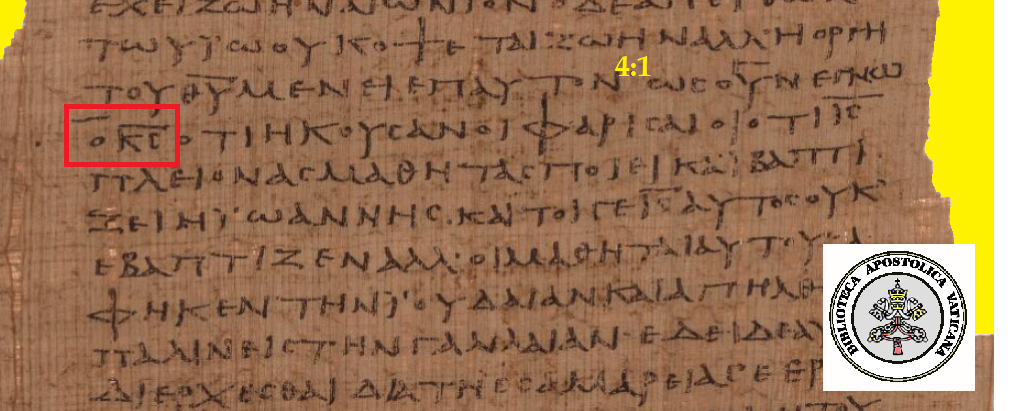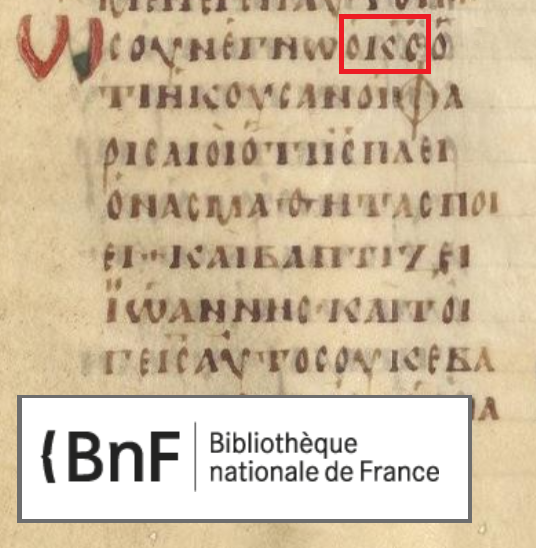In the Evangelical Heritage Version, Matthew 17:21 says, "But
this kind does
not go out except by prayer and fasting.”
The KJV, NKJV, EOB-NT, MEV, WEB, and 1995 NASB read similarly. In the RV 1881, ASV, ESV, NIV, NLT, and NRSV,
however, there is no such verse; the versification jumps from 20 to 22. What has happened?
Bruce Metzger did not spend many words
explaining: “Since there is no good
reason why the passage, if originally present in Mathew, should have been
omitted, and since copyists frequently inserted material derived from another
Gospel, it appears that most manuscripts have been assimilated to the parallel
in Mk. 9.29.” (Textual Commentary on the GNT, p. 43) His concise treatment is unsatisfactory for
at least three reasons, first of which is the consideration that Matthew
himself when using Mark’s Gospel (or something closely resembling it) had no
discernible reason to skip over this statement of Jesus. Bruce Manning Metzger
Second, the external evidence merits a closer look. Neither the apparatus in the UBS GNT nor the Nestle-Aland NTG is sufficient. We begin with their data, supplemented by Swanson: verse 21 is absent in À* B Q 579 788 892* l253 ite ff1 the Sinaitic Syriac, the Curetonian Syriac, Palestinian Aramaic, the Sahidic version, some Bohairic witnesses, an Ethiopic witness, and an early strata of the Old Georgian version. Everything else favors the inclusion of τοῦτο δὲ τό γένος ούκ ἐκπορεύεται εἰ μὴ ἐν προσευχῇ καὶ νηστείᾳ (Àc reads ἐκβάλλεται instead of ἐκπορεύεται, 118 reads ἐξέρχεται, and 205 1505 l1074 read εξέρχεται) – including C D F G H K L Y O W Y Δ Σ Φ 0281 f1 f13 28 157 180 565 597 678 700 892c 1006 1010 1071 1241 1243 1292 1342 1424 Byz Lect ita itaur itb itc itd itf itff2 itg1 it1 itn itq Vulgate Peshitta Harklean Syriac Armenian some Georgian, and the patristic evidence is lopsided in favor of inclusion: Origen Asterius Basil-of-Caesarea Chrysostom Hilary Ambrose Jerome Augustine. Hort noted that daemonii is sometimes added in Old Latin witnesses. The writer of an article at NeverThirsty stated, “The verse is not included in the newer Bibles because the older and better manuscripts of Matthew do not include it” and “Apparently in the process of copying the manuscripts, someone at a much later date copied the verse from the Gospel of Mark and added it to the Matthew account. “
Now let’s zoom in on some patristic witnesses.
In 2010 Jonathan C. Borland presented a paper titled “THE AUTHENTICITY AND INTERPRETATION OF MATTHEW 17:21”
at a gathering of the Evangelical
Theological Society in
● The author known as Pseudo-Clement,
in Letters on Virginity (1:12) did
not specify which Gospel he was quoting but the wording looks more like Matthew
17:21 than Mark 9:29 when he wrote
against individuals who “do not act with
true faith, according to the teaching of our Lord, who hath said: ‘This kind
goeth not out but by fasting and prayer,' offered unceasingly and with earnest
mind.’”
● Clement of Alexandria, c. 200, in Extracts from the Prophets, wrote, “The Savior plainly declared to the believing apostles that prayer was stronger than faith in the case of a certain demoniac, whom they could not cleanse, when he said, ‘Such things are accomplished successfully through prayer.’”
● Tertullian, in de Jejun 8:2-3, without specifying
whether he was citing Matthew or Mark, wrote the following: “After that, he prescribed that fasting
should be carried out without sadness. For
why should what is beneficial be sad? He taught also to fight against the more
fierce demons by means of fasting. For is it surprising that the Holy Spirit is
lead in through the same means by which the sinful spirit is lead out?”
● Origen, in his Commentary on Matthew (13:6-7) wrote, “That
those, then, who suffer from what is called lunacy sometimes fall into the
water is evident, and that they also fall into the fire, less frequently
indeed, yet it does happen; and it is evident that this disorder is very
difficult to cure, so that those who have the power to cure demoniacs sometimes
fail in respect of this, and sometimes with
fastings and supplications and more toils, succeed.” And, “But let us also attend to this, ‘This kind goeth not out save by prayer and
fasting,’ in order that if at any time it is necessary that we should be
engaged in the healing of one suffering from such a disorder, we may not
adjure, nor put questions, nor speak to the impure spirit as if it heard, but
devoting ourselves to prayer and fasting,
may be successful as we pray for the sufferer, and by our own fasting may
thrust out the unclean spirit from him.”
● The Latin writer Juvencus wrote in Book 3
of Libri evangeliorum quattuor, “For by means of limitless prayers it is faith and much fasting
of determined soul that drive off this kind of illness.”
Although
defenders
of modern versions have claimed that “The verse is not included in the newer Bibles
because the older and better manuscripts of Matthew do not include it,” antiquity
in this case favors inclusion: the oldest
witness for inclusion is older than the oldest witness for non-inclusion.
The scope of attestation also favors inclusion at least as
much as it favors non-inclusion: Western
witnesses for inclusion far outnumber the Western witnesses for non-inclusion,
and they are geographically widespread.
We are left with the appeal to the “best” manuscripts as
the basis for rejecting the verse. But
this is circular reasoning; the real question is “What are the best witnesses at this specific point?”, and
generalizations simply do not answer that question. It is like deciding which football team wins the ballgame when the score is tied by asking which kicker has made the most field goals, instead of by actually scoring more points than the other team.
Third, this supposed harmonization doesn’t yield a tight harmony. Let’s compare the text of Matthew 17:21 to Mark 9:29. Mark wrote, τοῦτο τό γένος ἐν οὐδενὶ δύναται ἐξελθειν εἰ μὴ ἐν προσευχῇ καὶ νηστείᾳ. (Regarding the Alexandrian text’s non-inclusion of καὶ νηστείᾳ, see my earlier analysis.) Metzger’s plea that Mark 9:29 was transplanted into Matthew 17 is complicated by the distinct lack of verbal similarity:
Matthew: τοῦτο δὲ τό γένος ούκ
ἐκπορεύεται εἰ μὴ ἐν προσευχῇ καὶ νηστείᾳ.
Mark: τοῦτο τό γένος ἐν οὐδενὶ δύναται ἐξελθειν εἰ μὴ ἐν προσευχῇ καὶ νηστείᾳ.
This
is not a verbatim harmonization – out
of 12 words (in Matthew 17:21), nine are identical – and Metzger’s comment that
“copyists frequently inserted material derived from another Gospel” fails to explain
why a scribe with Mark 9:29 in front of him would change 25% of its wording
when inserting it into the text of the Gospel of Matthew. It should also be noted that the kind of
harmonization Metzger referred to usually involved harmonization to
the text of Matthew in Mark and Luke, not the other way around (the harmonization
of Matthew 9:13 and Mark 2:17 to Luke 5:32
being a notable exception).
I
propose that an early Western scribe intentionally omitted the material we know
as Matthew 17:21 out of concern that readers might think that the ability of
the Son of God was limited depending on whether he fasted or not. (The same concern motivated the omission of καὶ νηστείᾳ in Mark 9:29.) This exclusion was
subsequently adopted by scribes in the Alexandrian transmission-line, which led
to the reading (or non-reading) in À B Q et
al.
Matthew 17:21 should be regarded as an authentic part of the Gospel of Matthew. The oldest evidence, the most geographically diverse evidence, and the vast majority of evidence all point in favor of its inclusion. The NIV, ESV, etc. should be corrected accordingly.
Thanks to Jonathan Borland for sharing his insightful research.









